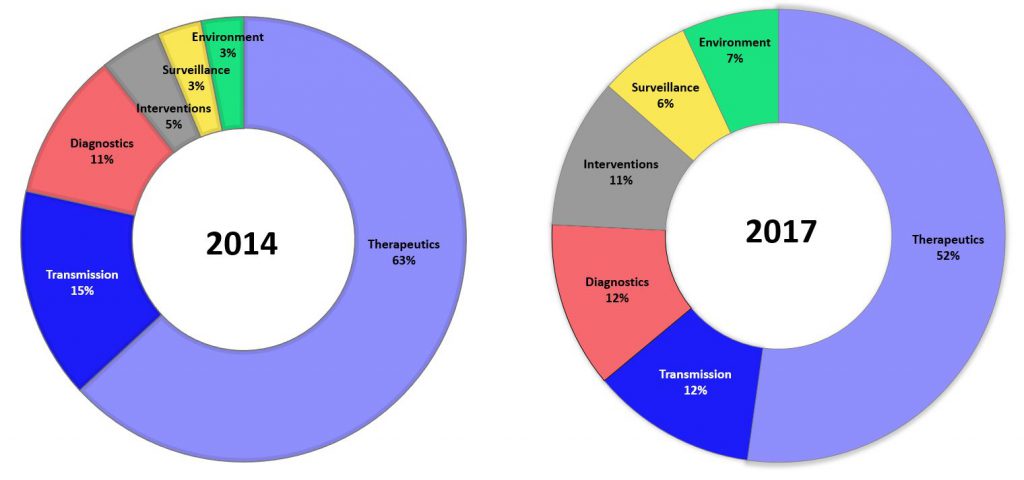JPIAMR has undertaken extensive mapping exercises to obtain an overview of the grant investments, research capacity and scope among JPIAMR member countries for AMR research.
In 2014, the JPIAMR conducted the first systematic analyses of public funding of research on antibacterial resistance. Databases of public funding organisations across 19 countries, and at EU level, were systematically searched for publicly funded antibacterial resistance research from 2007 to 2013, and categorised around the JPIAMR Strategic Research and innovation Agenda’s (SRIA) six priority topics – therapeutics, diagnostics, surveillance, transmission, environment, and interventions. 1243 antibacterial resistance research projects were identified with a total public investment of 1.300 millon € across 19 countries and at the EU level, including public investment in the Innovative Medicines Initiative. The picture of this funding landscape guided the JPIAMR member countries and their joint investments towards future AMR research.
Read more in the report on Mapping of AMR research funding (2014). A summary of the report is also available: Summary: Mapping of AMR research funding (2014)
The 2017 exercise involved mapping of AMR (including anti-fungal, anti-parasitic and anti-bacterial) research undertaken in the JPIAMR member countries and research funded by the European Commission and the Wellcome Trust. We recorded a total investment of 1 794 million € from 1 939 projects in AMR, within the broad remit of the JPIAMR SRIA six priority topics in the 2017 mapping.
Read more in the report on Mapping of AMR research funding (2017).
Distribution of projects by JPIAMR-SRIA priority areas
Research investment seems to be better distributed to the different priority areas in the 2017 mapping rather than the one performed in 2014. The results from both the mappings highlight the need for increased investment across all member countries and also to diversify investments beyond the therapeutics area.

Related links
- Excel file with AMR projects from mapping database 2014
- Excel file with AMR projects from mapping database 2017
- Article in the Lancet (December 2015): Public funding for research on antiabacterial resistance in the JPIAMR countries, the European Commission, and related European Union agencies – a systematic observational analysis
Global AMR R&D Hub Dynamic Dashboard
The Global AMR R&D Hub’s Dynamic Dashboard continuously collects and presents information on AMR R&D investments, products in the pipeline and push and pull incentives across three galleries. It will provide the evidence base to help set priorities and maximize the impact and efficiency of resources and efforts invested into AMR R&D.
Investments in AMR R&D
The Investment Gallery of the Dynamic Dashboard presents information on human bacterial and fungal infections and all AMR relevant infections in animal health. The scope of the Investment Gallery continues to evolve and will soon encompass all One Health sectors and other relevant pathogens.
Visit the Investment Gallery Dashboard
Antibacterials in clinical development
The Pipeline Gallery brings together information about antibacterial products for human use in clinical development from the World Health Organization and The Pew Charitable Trusts analyses.
Visit the Pipeline Gallery Dashboard
Incentives for antibacterial R&D
The Incentives Gallery displays draft or implemented incentives, with global reach, targeting therapeutic markets for human antibacterials.
Visit the Incentives Gallery Dashboard
Other resources and funding possibilities
- AMR Conference
- Fleming Fund
- University College London
- Wellcome Trust
- Longitude Prize
- The Global Antibiotic Research and Development Partnership (GARDP)
- The Netherlands Antibiotic Development Platform (NADP)
- The Infectious Diseases Society of America (IDSA)
- The Agency for Healthcare Research and Quality (AHRQ)
- The Foundation to Prevent Antibiotic Resistance
- Natural Products Discovery and Bioengineering Network (NPRONET)
- The International Society for Infectious Diseases (ISID)
